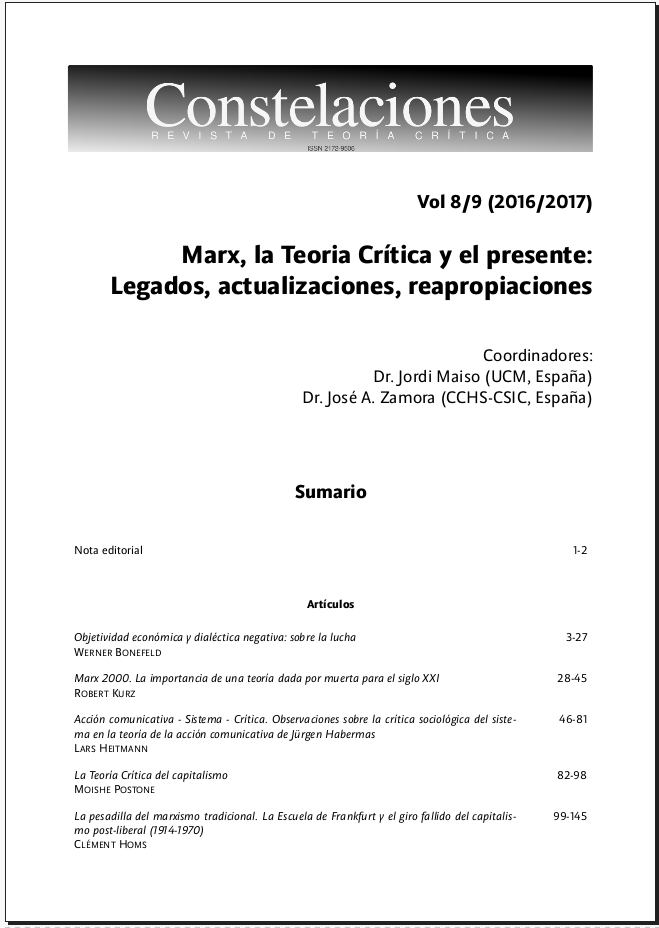Sociopolitics: Marx and Marcuse
Paraules clau:
sociopolitics, Marx, Marcuse, Social Forms of Society, Critical TheoryResum
By deciphering capitalist social forms of dependence of the political sphere relative to society, Marx discovers sociopolitics. Within it, the nexus between politics and social life occurs in a double key. On one side, politics is taken in its social dependence; on the other side, the focus must shift to the very social form determined by this dependence.
In sociopolitics, as a domination structure comanding social reproduction, power is in an immanent relation to the social forms of production in society. Beyond coercion or convincing, the social sphere is in itself political, with its common social objective condition of organization in a social determined form.
As Marx points out in the Grundrisse, the human beeing is a political animal not only in the sense of the social as collectivity, but as as a specific and determined social form of the social, already produced and in the reproduction process. Men individuate in the middle of a socialization, submitting themselves to the rationnality of the accumulation of capital and its contradictions. As capital is a contradiction by itself, in capitalist socialization there is a dialectics of domination and liberation of abstract capitalistic labor.
Marcuse follows Marx interpretation. For him, the objective condition characterizes a society as dependency on capital. As refered in One-dimensional Man, this dependency is in the social subject’s social form, rather than an imposition from the outside. The dependency is an outcome of the capitalist mode of production at the needs-engendering level – need of surplus labor – that is made universal.
To Marcuse, the political dispute is a dispute of forms of society: between the capital dependent society and a socialization form in which the need of surplus labor no longer suffices to the free developpment of the individualities produced in existing society. As stated in Counter-Revolution and Revolt, “the individual liberation must incorporate the universal in the particular protest, and the images and the values of a future free society must appear in the personal relationships within the unfree society.” In the present situation, transformation is linked with an anticipation of the possibility of an other socialization. “The time of the wholesale rejection of the ‘liberals’ has passed – or has not yet come. Radicalism has much to gain from the legitimate protest against war, inflation and unemployment, from the defense of civil rights (...) Presenting the facts and forces that made civilization what it is and what it could be tomorrow – that is political education”.
Descàrregues
Referències
MARCUSE, Herbert (1972) – Counter-Revolution and Revolt. Boston: Beacon
MARCUSE, Herbert (1991) – One-Dimensional Man. Boston: Beacon
MARX, Karl (1977) – Early Writings. London: Penguin
MARX, Karl (1981) – Grundrisse. London: Penguin
NEGT, Oskar & KLUGE, Alexander (1993) – Public Sphere and Experience. Minneapolis: University of Minnesota Press
OLLMAN, Bertell (2003) – Dance of the Dialectic. Chicago: University of Illinois Press
VOGL, Joseph (2013) – Le Spectre du Capital. Paris: Diaphanes
Descàrregues
Publicades
Com citar
Número
Secció
Llicència
Aquells autors que pugliquin en aquesta revista accepten els següents termes:
- Els autors conservaran els seus drets d'autor i garatiran a la revista el dret de primera publicació de la seva obra, la qual estarà simultàniament subjecte a la Llicència de reconeixement de Creative Commons que permet a tercers compartir l'obra sempre que s'indiqui la seva autoria i la seva primera publicació en aquesta revista.
- Els autors podran adoptar altres acords de llicància no exclussiva de distribució de la versió de l'obra publicada (p. ex.; depoditar-la en un arxiu telemàtic institucional o publicar-la en un volum monogràfic) sempre que s'indiqui la publicació inicial en aquesta revista.
- Es permet i es recomena als autors difondre la seva obra a través de Internet (p. ex.: en arxius telemàtics institucionals o en la seva pàgina web) abans i durant el procés de tramesa, la qual cosa pot produir intercanvis interessants i augmentar les cites de l'obra publicada.
Confidencialitat de les dades:
- Constelaciones. Revista de Teoría Crítica garanteix que les dades que ens trameti sols s'utilitzaràn per atendre les seves demandes manidestades en aquest missatge.
- Les seves dades no seran cedides a altra part.
- Quan ho desitgi pot solicitar que les seves dades siguin eliminades dels nostres registres.Teoría Crítica





